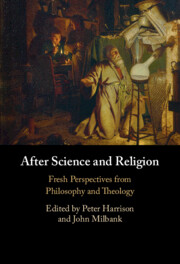Book contents
- After Science and Religion
- Reviews
- After Science and Religion
- Copyright page
- Contents
- Contributors
- Acknowledgements
- Introduction
- Part I Modern Historians on ‘Science’ and ‘Religion’
- Part II Beyond ‘Science and Religion’
- Part III Philosophical Problems with ‘Science’ and ‘Religion’
- Part IV Before Science and Religion
- References
- Index
Introduction
After Science and Religion?
Published online by Cambridge University Press: 05 May 2022
- After Science and Religion
- Reviews
- After Science and Religion
- Copyright page
- Contents
- Contributors
- Acknowledgements
- Introduction
- Part I Modern Historians on ‘Science’ and ‘Religion’
- Part II Beyond ‘Science and Religion’
- Part III Philosophical Problems with ‘Science’ and ‘Religion’
- Part IV Before Science and Religion
- References
- Index
Summary
The present literature on science and religion tends to be dominated by three genres: a conflict genre, according to which science and religion are locked into a relationship of perennial opposition; a disentangling genre, in which science does one sort of thing and religion does another; and a synthetic genre, in which science and religion are integrated, overlapped, or in some way related to each other in generally positive ways. While on the face of it these approaches could hardly be more divergent, in fact they share a common commitment to the idea that ‘science’ and ‘religion’ are valid, trans-historical categories that capture more or less perennial features of human culture. If it is true that science and religion, albeit in various guises, have been the chief lenses through which the world has been interpreted, then posing the question of how they relate to each other makes good sense. But what if it is not true? The guiding principle of the present collection is that we can initiate a much more fruitful discussion if we begin by questioning these two basic categories that frame and delimit the current conversation about how to interpret the world. After Science and Religion is thus an exploration of how the discussion might be changed if we were to relinquish, or at least critically examine, these two categories ‘science’ and ‘religion’.
- Type
- Chapter
- Information
- After Science and ReligionFresh Perspectives from Philosophy and Theology, pp. 1 - 12Publisher: Cambridge University PressPrint publication year: 2022



